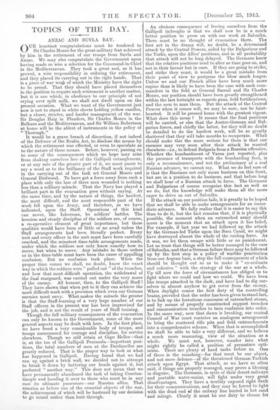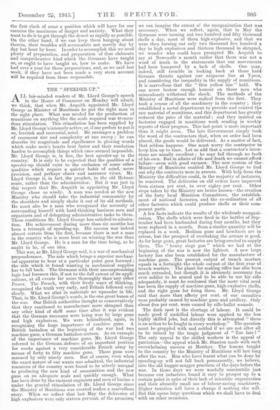TOPICS OF THE DAY.
ANZAC AND SUVLA BAY.
OUR heartiest congratulations must be tendered to Sir Charles Monro for the great military feat achieved by him in the retirement of our troops from Suvla and Anzac. We may also congratulate the Government upon having made so wise a selection for the Command-in-Chief in the Mediterranean. They took a great and, as it has proved, a wise responsibility in ordering the retirement, and they placed its carrying out in the right hands. That is a piece of war woi of which the Ministry have the right to be proud. That they should have placed themselves in the position to require such retirement is another matter, but it is one which, in obedience to our principle of not crying over spilt milk, we shall not dwell upon on the present occasion. What we want of the Government just now is not to stand in white sheets holding yellow candles, but a closer, stricter, and harder management of the war. Sir Douglas Haig in Flanders, Sir Charles Monro in the Balkans and the Mediterranean, and Sir William Robertson at home will be the ablest of instruments in the policy of " Thorough." It would be a grave breach of discretion, if not indeed of the Defence of the Realm Act, to disclose the means by which the retirement was effected, or even to speculate as to the nature of those means. Before, however, passing on to some of the consequences which we hope may arise from shaking ourselves free of the Gallipoli entanglement, or at any rate of the greater part of it, we must pause to say a word as to the brilliancy of the Staff work required in the carrying out of the task set General Monro and General Birdwood. To have got a force away from such a place with only the loss of three men wounded is nothing less than a military miracle. That the Navy has played a brilliant part in the evacuation goes without saying. At the same time, and by the nature of things, the hardest, the most difficult, and the most responsible part of the work fell upon the Army, and therefore, as we have indicated, upon the Staff. Operations of this kind can never, like Inkerman, be soldiers' battles. The heroism and steady discipline of the soldiers are, of course, a co-operative element of great importance, but these qualities would have been of little or no avail unless the Staff arrangements had been literally perfect. Every unit and every officer in the unit must have been carefully coached, and the minutest time-table arrangements made, under which the soldiers not only knew exactly how to move, but when to move. Any mistake in those orders or in the time-table must have been the cause of appalling confusion. But no confusion took place. When the proper time comes we shall, no doubt, know the exact way in which the soldiers were " pulled out " of the trenches, and how that most difficult operation, the withdrawal of the final rearguard, was carried out under the very noses of the enemy. All honour, then, to the Gallipoli Staff 1 They have shown that when put to it they can achieve the most difficult work with a precision which even our German enemies must envy. What makes the miracle the greater is that the Staff-learning of a very large number of our Staff officers in the present war has been improvised for the job, and is not the result of years of Staff training. Though the full military consequences of the evacuation can only be known to the Government, some of the more general aspects may be dealt with here.. In the first place, we have freed a very considerable body of troops, and troops unsurpassed for courage and discipline, for service elsewhere. Though we still retain at Cape Helles—that is, at the toe of the Gallipoli Peninsula—important posi- tions, the total numbers of men at the Dardanelles are greatly reduced. That is the proper way to look at what has happened in Gallipoli. Having found that we had run up against a brick wall, we decided not to attempt to break it down by battering our heads against it, but preferred " another way." This does not mean that we have permanently abandoned the task of taking Constan- tinople and handing it over to those who must be in any case its ultimate possessors—our Russian allies. That remains as before one of the essential objects of the war, the achievement of which will be hastened by our decision to go round rather than butt through. An obvious consequence of freeing ourselves from the Gallipoli imbroglio is that we shall now be in a much better position to press on with our work at Salonika. There must be no thought of evacuation there. The first act in the drama will, no doubt, be a determined attack by the Central Powers, aided by the Bulgarians and the Turks, upon the Allies' positions, and in all probability that attack will not be long delayed. The Germans know that the relative positions tend to alter as time goes on, and not in their favour but in ours. If they are going to strike; and strike they must, it would be a great mistake from their point of view to postpone the blow much longer.' Unless we and our French allies have been much more supine than is likely to have been the case with such com- manders in the field as General Sarrail and Sir Charles Monro, our position should have been greatly strengthened within the last fortnight as regards guns, field fortifications,' and the men to man them. But the, attack of the Central Powers when it comes will, we may be sure, not be faint- hearted. It will be pressed home with the greatest vigour. What does this mean l It means that the final positions will be carried, or else that. the Austro-German and Bul-, garian forces, and chiefly the latter, for they will no doubt be detailed to do the hardest work, will be so greatly shattered that they will take months to recuperate. What should make this the more serious for them is that our enemies may very soon after their attack be wanted. elsewhere—s.e., to defend Bulgaria from a Russian offensive. Whether the bombardment of Varna just reported, plus the presence of transports with the bombarding fleet, is only a reconnaissance, and not the preliminary of a real Russian advance, we cannot say. What we do feel sure of is that the Russians not only mean business on this front, but are in a position to do business, and that before long we shall hear of a Russian attack in force. The Germans and Bulgarians of course recognize this fact as well as we do, but the knowledge will make them all the more eager to drive us out of Salonika.
If the attack on our position fails, it is greatly to be hoped that we shall be able to make arrangements for an imme• diate advance. We fully realize that it is easier to say this than to do it, but the fact remains that, if it is physically possible, the moment when an entrenched army should move is the moment that an attack upon it has failed. For example, if last year we had followed up the attack by the German-led Turks upon the Suez Canal, we might have destroyed almost the whole of the raiding force. As it was, we let them escape with little or no punishment. Let us trust that things will be better managed in the case of Salonika, and that a German failure there may be followed up by the first step in a policy of warlike penetration from our Aegean base, a step the full consequences of which should be thought out so as to make it " co-ordinate and cohesive " with the strategy of the war as a whole. Up till now the force of circumstances has obliged us to fight where we could and how we could. We have been, like troops attacked in the dark, and have had to dig our- selves in almost anyhow to get cover from the enemy. When daylight comes the first duty of the controlling brains, provided that the order has been given to stand fast, is to link up the fortuitous concourse of entrenched atoms, and by means of properly constructed support trenches and communication trenches to turn confusion into order. In the same way, now that dawn is breaking, our central, Council of War must contrive an analogous arrangement to bring the scattered rifle pits and field entrenchments into a comprehensive scheme. When that is accomplished we shall be able to take a very different, and we believe' a much more reassuring, view of the situation as a whole. We must not, however, wander into what might rightly be called a position of premature opti- mism. There are plenty of hard tasks before, us. One of these is the smashing—for that must be our object, and not mere defence—of the threatened German-Turkish attack upon Egypt. That attack, as we have so often said, if things are properly managed, may prove a blessing in disguise. The Germans, in spite of their desert railways, and portable water-mains, will fight under very great disadvantages. They have a terribly exposed right flank for their communications, and they may be forced to fight with the dead end of the railway line buried in hot sand and mirage. Clearly it must be our duty to choose for the first clash of arms a position which will have for our enemies the maximum of danger and anxiety. What they want to do is to get through the desert as rapidly as possible. On the other hand, if we can keep them hanging about therein, their troubles will accumulate not merely day by day but hour by hour. In order to accomplish this we need plenty of preparation, and preparation of that elaborate and comprehensive kind which the Germans have taught us, or ought to have taught us, how to make. We have had over a year for those preparations, and, as we said last week, if they have not been made a very stern account will be required from those responsible.



































 Previous page
Previous page